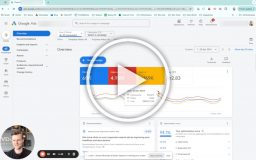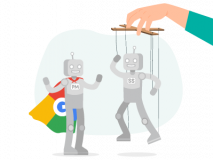As with everything, the impact of the work you get from someone is directly equal to the quality you put into your work with them.
Advertisers have a love/hate relationship with moving agencies. They never want to move, but some advertisers move way too much. Instead of looking for the grass being greener, try to use these tips to improve your relationship instead.
I have seen cases where we did nothing else different than change the way we worked with a client vs the way they worked with their old agency.
And I have coached numerous in-house PPC managers in how they should work with their boss as well as marketing directors on how they should work with their marketing team.
In today’s post I review the best ways you can work with your PPC resources (internal, external, etc.) to get the success you need.
Note: In everything I list here I assume that the person/freelancer/agency you’ve hired is great and not a mediocre “expert.” This means they aren’t one of the people you’ve tried and who did a horrible job. The main points of this post expand on how your already-great PPC manager/agency can do better, thanks to the changes you’ve implemented.
You Don’t Treat Your PPC Manager As Part of Your Business
I was once asked by a client why things weren’t moving as fast as they used to. They felt like we weren’t moving as fast as we had been previously.
The answer was clear: We weren’t meeting on a regular basis anymore.
We had gone from having bi-weekly calls and extensive quarterly meetings to not talking for months. This happens in business, and we’re ready to handle periods of time where we need to be autonomous.
Once we restarted the original meeting cadence, we were able to come up with marketing tests faster and turn them around more frequently. We knew someone was sitting at the other end ready to move on the outcomes we found.
Ever since then, we deliberately try to foster two-line communication as much as possible in SavvyRevenue. The more we stay in ongoing communication, the more both sides of the table get done.
Whether or not you treat your PPC manager (whether it’s agency or in-house) as a partner is directly measured in how many conversations you have with them. If you just read the report they send once a month without feedback or questions, or only send over “orders to be executed” without other communication, then you’re missing out a big part of your potential returns.
When you can think your PPC manager is being sloppy think whether or not you’re truly taking them into account when you run your business and if you could take better advantage of their skills, experience, and feedback.
You Have a Sub-Par Success Criteria
A conversation we often have is how do we measure success:
Some say ROAS.
Some say revenue.
Some say revenue at a certain ROAS-level.
Some say revenue at a certain ROAS-level broken into major categories.
But the best say profits and customer lifetime value.
Give your PPC manager a bad target, and you’ll get bad results.
Your target might change as your company changes. The initial target you set when launching the relationship will undoubtedly need to change if you grow the inventory by 500% or become better at maximizing the customer lifetime value. Set goals with your PPC manager so you’re on the same page and know expectations going forward.
The Agency’s Fee MUST Be Part of Your Success Criteria
One key part of your calculations that I see some advertisers forget is ensuring that your success criteria include agency fees.
Off course it’s important to give the agency fee a true value that translates into what else you’re doing. Did you used to spend two days a week on what the agency is taking over? Now it’s important to give that time a proper value. What are you able to do in your business now that your agency is running the show?
You’re Not Engaging In Proactive Planning
It’s easy for PPC managers in online marketing to just go with the flow. There are enough small tasks to be done that you can often just skid along happily doing stuff you think is important, but doesn’t actually accomplish anything.
This is especially the case if PPC managers are overburdened. They will likely push back on this thinking, but you want your PPC manager to plan the major actions on your account on a quarterly basis (or whatever suits your business).
There has to be a time where everyone sits down and thinks through opportunities.
You might sit in the muck of it all and think: Well, we don’t have anything major to do this quarter.
Try again.
This time, do the following:
- Imagine you were brand new to this account.
- List the activities in the business that will happen the next 3-12 months.
- Anything from promotions to inventory changes to logistics.
- Analyze the account for each major aspect (Shopping, Search, Display, Devices, Ad Messaging, etc.)
- If you HAD TO, what would you do to improve?
- If someone else came on board, what would you be sad to hear from someone else that you haven’t said?
- From the list of business activities, ask yourself: What will need to happen for us to get the highest return?
Now you’ll start getting the ideas flowing.
The ideas are not supposed to be small day-to-day areas of in your account.
For example, change bids = no.
Trying a new pricing strategy and then manage bids, ads and keywords accordingly = Yes.
Break campaigns into mobile and desktop/tablet campaigns = Yes.
Review Facebook Attribution for mobile/desktop cross-over and adjust ROAS targets = Yes.
You’re Relying Solely on In-House Personnel
The following might be a dramatic statement that no-one in the agency space likes, but:
In-house teams can always outperform agencies (on paper)
If you could hire the exact same person in-house, then she would (read: should) be able to do better because she has more time to dig into your marketing, learn your business better and can integrate with other channels or departments seamlessly.
However, the opposite is often true as well.
In-house people are sick and tired of:
- Routine tasks with no end in sight
- Running meaningless reports for brand managers
- Not having a say in the direction, goals, or strategy
- Being considered as backward because they don’t get to “rock the boat” and try new things
So even though you should, on paper, be able to get more out of hiring an in-house person, than just hiring a person, locking her to a desk and then wonder why your performance drops are going to get you there.
In-House PPC Managers Need Sparring, Autonomy, and Authority
The solution to bored in-house PPC managers is obvious: ensure that you engage in continuous learning and sparring for your team.
The challenge is that many eCommerce managers, Head of Marketing, etc. lacks sufficient channel-specific knowledge (i.e. Google Ads experts) to provide proper guidance for their team.
A great solution is partnering with an agency/freelancer as a sparring-partner for your team.
We all need someone to lean on when times are tough, and if the immediate manager doesn’t know much about PPC, then it can be frustrating not to be able to get direction when you really need it.
We had a case where a client had overspend, and the in-house team we provided sparring to needed help on how to go about it. It was a conversation they were able to speak openly with us without fear of retaliation. We’re not their boss. We don’t care that they dropped the ball for a couple of days. Our job is to equip them to avoid mistakes, and when they do happen, we ensure they never happen again.
PPC Managers Can’t Just Be Left Alone
Too often I see companies compare an agency expense with an in-house expense and go: “Oh, it’s about the same.” They then hire internally and have no additional funds for sparring, an outside perspective from agencies, or ongoing learning for their in-house staff because it would erode the margins they have to get.
(Oh, an please don’t tell me you send your team to conferences for ongoing learning. It’s a beer fest with some inspirational powerpoints in-between. They certainly have their place, but don’t mistake conferences for learning time).
I’ve also seen horrible work from in-house people that just needed a better framework and someone to spar with in order to produce amazing results.
This can be as simple as attending more conferences initially, but should be expanded through deliberate sparring with internal or external expert resources.
Not Graduating From Your Agency or PPC Manager
You never want to be the largest client at an agency or have your campaigns being the biggest campaigns she has ever worked on.
Back in my White Shark Media days (my first 8-figure agency), we continued to have issues with the inflexibility of our payment processor. I could never understand why other, similar-sized businesses didn’t have the same issues that we had – and why the company hadn’t improved their product accordingly.
One day in a meeting, I found out why. A new account manager accidentally blurted out that we were in fact their biggest client.
That was when the penny dropped for me.
They weren’t ready for the scale that we came with. They were trying to learn how to scale their product with us as the test subjects.
There are times where you can get a high return on your investment by working with a new up-and-coming star who you allow to “learn on your dime.” But more often than not, such an agency will cost you more money in missed opportunity than what you’re saving in lower fees.
The Same Goes If You’re The Smallest
On the other end of the spectrum, then you don’t want to be the smallest. The senior staff in the agency will not want to work with you. You’ll stay with a junior representative, at best, and at worst you’ll work with a Senior who says all the right things but doesn’t execute on your account because your organization doesn’t really motivate him to do better on your behalf.
If you suspect that you’re the smallest client at your agency and you’re being neglected, then go out and ask your rep. You might need to get to a senior employee in the client management department, but get the conversation going.
Often, the agency will be happy to find a replacement for them if you’re their smallest client anyway (and if they’re not, consider whether that’s a place you want to stay).
Don’t Be The Absolute Largest or Absolute Smallest Client
Due to the law of math, then there will always be a “biggest” and a “smallest”. But at least try not the be the absolute smallest or absolute biggest by any margin to prevent poor service.
Chances are that if you’re the biggest, then your agency is actively trying to find ways to counter the risk that you’re posing (aka spending more time getting new accounts on board) anyways. Or you’re becoming such a big part of their business that they’re no longer able to give you unbiased advice.
To conclude on the part about having the right person/agency for the job, then it’s not always the best to go with the agency/person that seems the most senior. You need to find someone who will be the best fit for the responsibility you give them.
In Conclusion
People in an agency often have access to senior experts that can give their thoughts on a case without costing a fortune. An outside perspective can sometimes be just the thing you need to improve a marketing strategy or specific channel.
The great agencies rarely give excuses for low performance, but state what the problem is and then gives you solutions. Granted, you might not like the solutions (like the suggestion that your prices are too high).
An ability to spar and gain feedback from colleagues is something that comes naturally in the best agencies.






